2020 has been undoubtedly a challenging year and it is no less true for companies around the world. As we battle to make sense of the on-going crisis and figure out when things will get back to normal, there still remains lack of clarity and uncertainty, not just for job seekers but also for hirers. The ability of corporates in terms of taking informed decisions related to projections remains hampered. And with so much news making rounds related to layoffs, salary cuts, and whatnot, it is only normal to be paranoid. In this context, the article will give an idea of how much various factors have changed from the recruiters' point of view and what does it mean for job seekers.
This article is based on the GMAC Corporate Recruiters Survey which has rightfully captured the current job market scenario in very details. Graduate Management Admission Council or GMAC conducts an annual poll of prominent recruiters around the world who hire students from b-schools -regularly. Every year the survey helps to understand the trends and insights on hiring, salary, and skills of MBA graduates. This year’s report has been made by GMAC by taking the COVID angle in account due to the heavy disruptions caused by the pandemic in hiring and recruitment.
The survey has collected data in two phases: Wave I (between February 17, 2020 and March 17, 2020) and Wave II (between June 17, 2020 and July 17, 2020) to make a comparison of changed perceptions among recruiters. In Wave I, 232 recruiters and 135 business schools participated while 712 recruiters and 147 institutes participated in Wave II. The significant decrease in the number can be attributed to changed priorities of the recruiters due to the unprecedented situation at hand. The recruiters belonged to various industries including consulting, finance, technology, manufacturing, and health care, among others.
The findings from the recruiters' survey are optimistic, to say the least, and doesn’t show a lot of deviation from their initial plans in terms of hiring and recruitment globally.
Confidence In B-Schools To Prepare Graduates & In B-School Hires’ Abilities In Their Corporate Lives
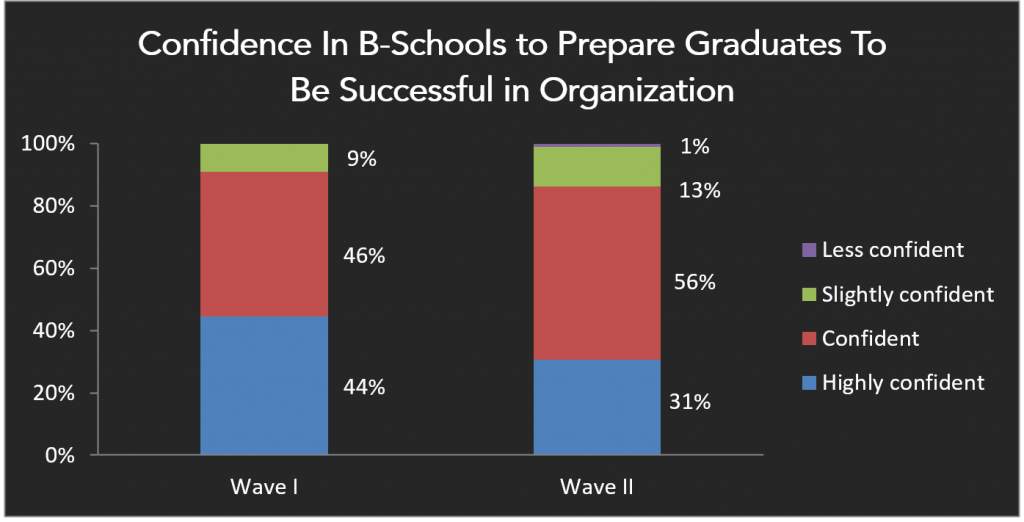
Key Points from the report:
- 90% of the respondents in Wave I was either highly confident or confident in Business school’s ability to prepare students to be successful in their corporate lives. The percentage reduced slightly to 87% in Wave II.
- Going by industry, 89% consulting companies, 85% finance companies and 83% technology companies said they were either highly confident or confident in business schools to prepare graduates to be successful in an organisation. Further, it is to be noted that 6% of technology companies said they had no confidence in B-Schools to Prepare Graduates to be Successful in Organization.
Change in skill importance of B-School graduates as a result of COVID 19
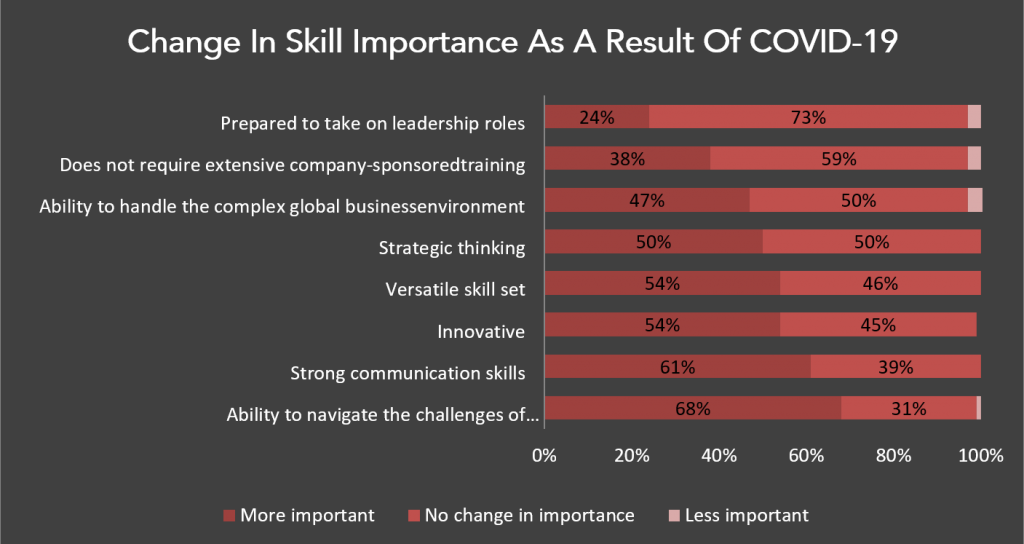
Key Points from the report:
- In Wave I, only 33 percent of respondents described the state of the global economy as very strong or strong as compared to just 7 percent in Wave II (see chart). This suggests that even in a weak global economy, confidence in a business school’s ability to prepare future managerial talent remains steady.
- When asked about the reasons why recruiters have faith in MBA graduates to take up leadership roles in corporates amidst the pandemic, the responses included various key skills with “strategic thinkers”, “strong communication skills” and “versatile skill set” being the most voted ones.
- Ability to navigate the challenges of technological disruption was the most relevant and most voted skill of Business School graduates.
When asked about reasons as to why they would hire MBA graduates over someone without an MBA degree, here are some of the things that top recruiters mentioned in terms of their confidence in MBA graduates’ skills and abilities to navigate through challenges on joining organisations.
“Candidates with graduate management education tend to have greater ability to analyze problems, define strategies and communicate with peers and superiors.” - Recruiter from a Fortune 100 organization in the Technology sector.
“Ability to work in ambiguity, stronger analytical acumen, and leadership.” - Recruiter from a Fortune 500 organization in the Finance sector
Company Direction In 2020, By Organization Headcount Plans
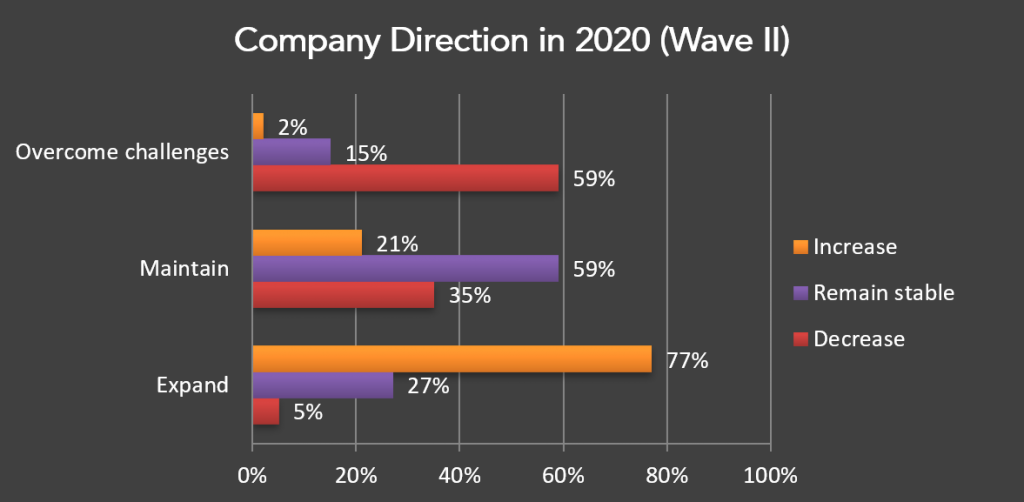
Key Points from the report:
- Overall, when it came to plans for expansion, overcoming challenges doubled between Wave I and Wave II but it is still at about 20 percentage of the total. A vast majority of the respondents in Wave II report that their companies plan to maintain current market position.
- In terms of headcount plans, 77% respondents plan to expand increased in Wave II while 59% mentioned that their plans to maintain headcount remained stable in Wave II.
Hiring Projections: The Optimism of Rebound in 2021
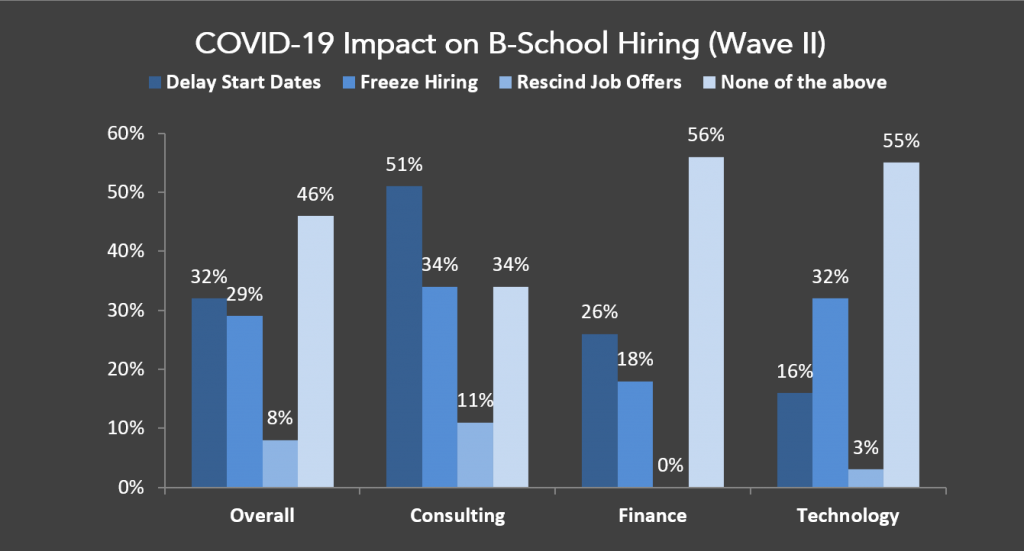
Key Points from the report:
- While 7% of recruiters had plans of decreasing headcount in Wave I, it increased to 17% in Wave II.
- When it comes to increasing headcount, the percentage reduced from 48% to 22% but the percentage of respondents mentioning a stable outlook increased significantly from 44% to 61%.
- On dividing the plans by industries, it was observed that consulting and finance companies planned on increasing hiring much more compared to technology companies. Also, finance companies were least likely to reduce headcount.
- When asked about their plans to either delay joining or rescind offers or freeze hiring due to COVID 19 in Wave II, only 8% responded saying they have rescinded offers. While 32% planned on delaying the joining dates, 29% froze hiring from the class of 2020. 46% responded to none of the above option indicating on the continuation of their initial recruitment plan.
- Going by industry, consulting companies majorly said that they plan on delaying start dates likely because they are waiting to gain more clarity about their organizations’ ability to secure future business amid all the economic uncertainty. No finance companies in the sample data said they would be rescinding job offers.
- When it came to hiring international business graduates, the plans to hire remained almost constant. Majority of them responded saying they don’t hire international graduates with 55% in Wave II. Also, 31% recruiters in Wave I and 20% recruiters in Wave II responded saying that they have the willingness to hire but have no plans as of now.
Hiring Trends of Business School Interns
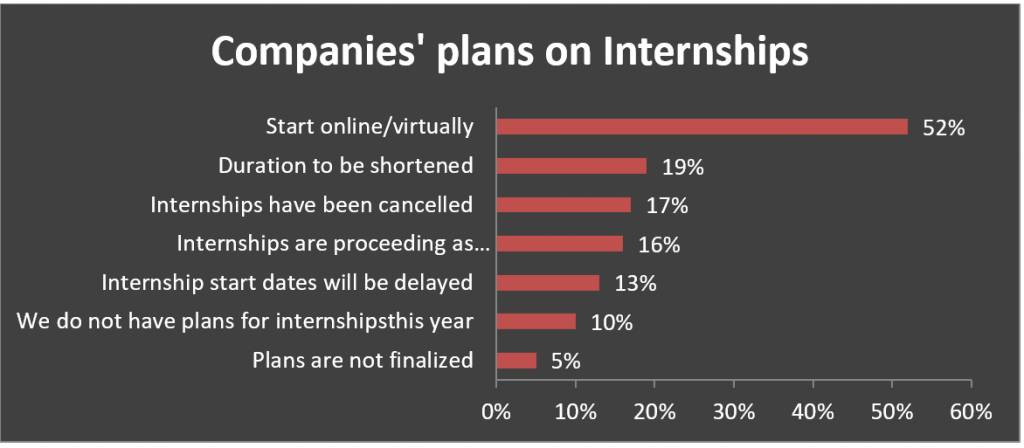
Key Points from the report:
- Willingness to hire Business School interns went up from 85% in Wave I to 89% in Wave II.
- As far as gauging COVID’s impact on internships goes, majority of the recruiters (52%) responded saying they plan to start the internship process virtually/online. 19% of them said they are planning to shorten the internship period while 17% said the internships have been cancelled.
Salary Trends: Premium Endures Under Pressure
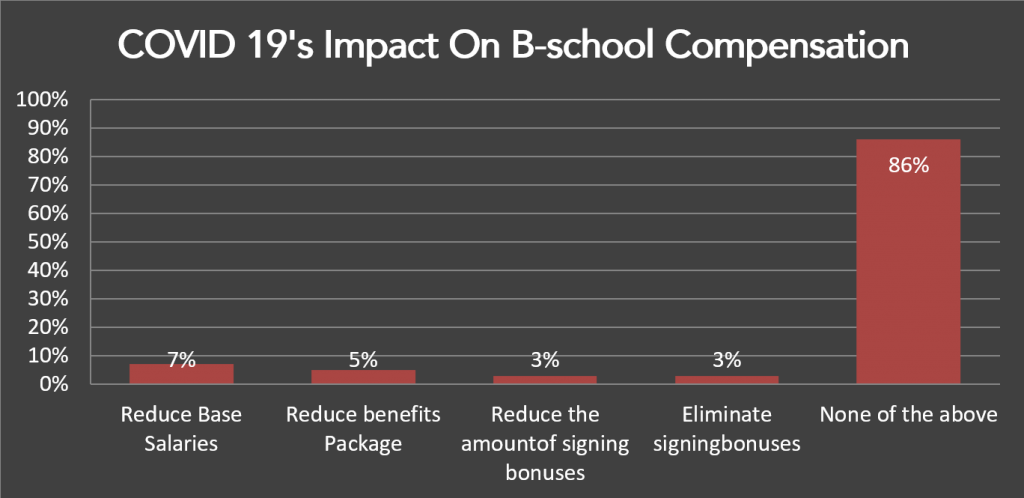
Key Points from the report:
- A vast majority of recruiters are not reducing salaries, benefits or bonuses for the class of 2020 as a result of COVID-19. 7% responded saying they will reduce base salaries.
- The median base salary for the class of 2020 is projected to decrease from $115,000 to $105,000 after the start of the pandemic.
- At $115,000, the median salary of MBAs is 75 percent more than those with a bachelor’s degree in Wave I. The compensation premium is even more apparent for Fortune 100 companies or the big-three industries that hire the most MBAs—consulting, finance, and technology. For example, at $145,000, the median salary of MBAs in the consulting industry is twice that of bachelor’s degree holders in Wave I.
To conclude, it is clear from the survey that MBA graduates have surely taken the hit of COVID 19 and there revolves an uncertainty in these difficult times. However, the insights and findings from the 2020 Corporate Recruiters Survey suggest optimism and the fact that employers remain confident about the value business graduates can add on joining their organisations. This is apparent in their relatively steady hiring projections and salary trends. In sum, the skills and abilities acquired by graduate management talent during their business school experiences make them a valuable asset in supporting organizational recovery and resilience and this is to stay even in the worst pandemic the world has seen in decades.
